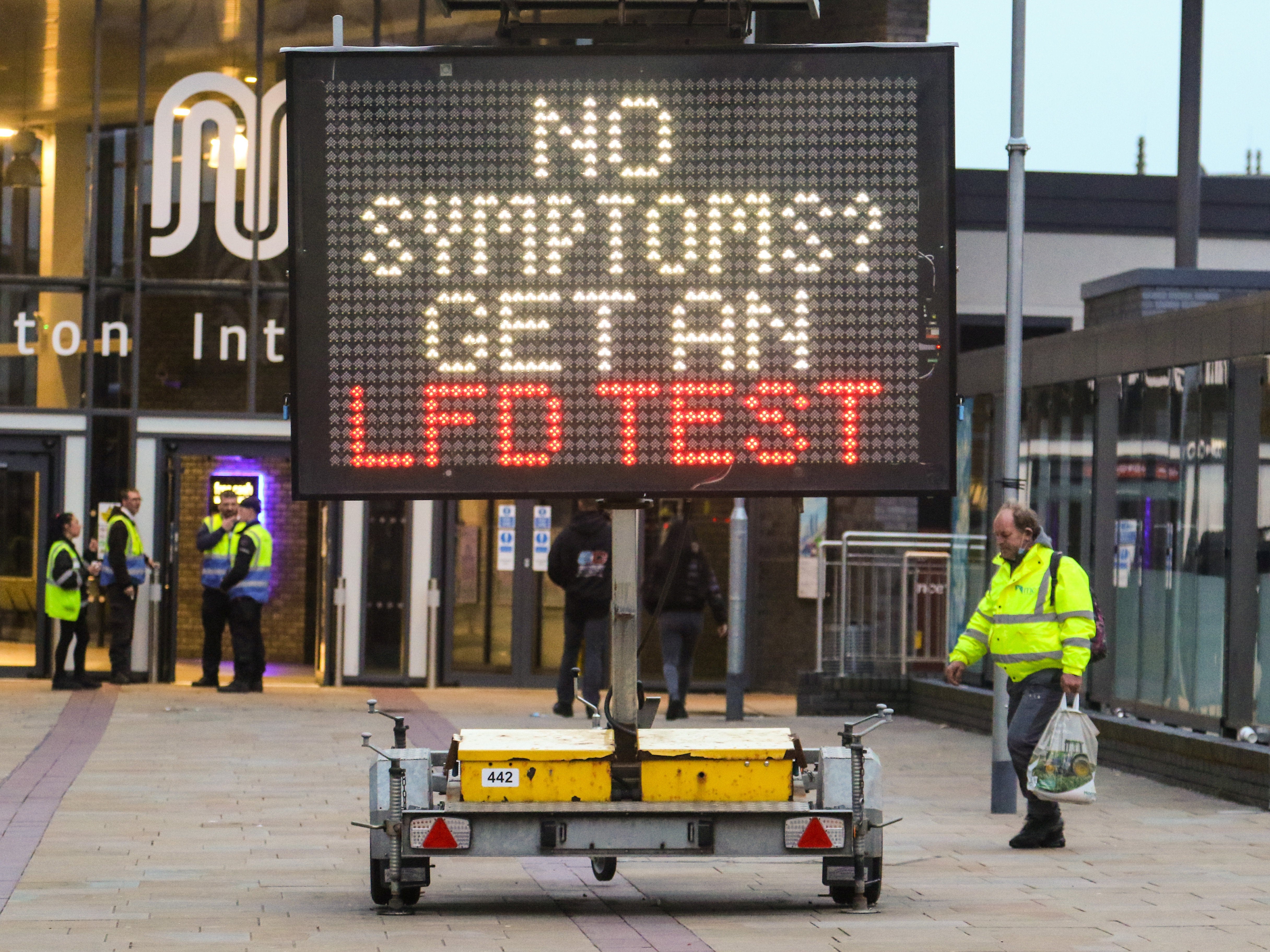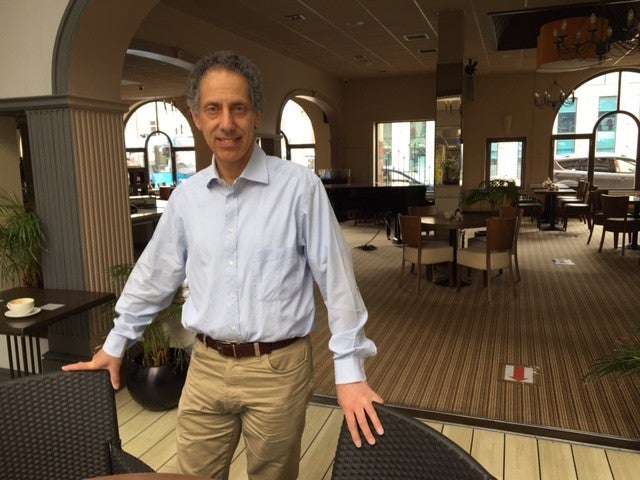‘Back to square one again’: Bolton fears yet another lockdown as Covid surge becomes ever more grim
Colin Drury visits a town once again the country’s virus hotspot, as questions emerge over whether the vaccine is less effective against the Indian variant


Your support helps us to tell the story
From reproductive rights to climate change to Big Tech, The Independent is on the ground when the story is developing. Whether it's investigating the financials of Elon Musk's pro-Trump PAC or producing our latest documentary, 'The A Word', which shines a light on the American women fighting for reproductive rights, we know how important it is to parse out the facts from the messaging.
At such a critical moment in US history, we need reporters on the ground. Your donation allows us to keep sending journalists to speak to both sides of the story.
The Independent is trusted by Americans across the entire political spectrum. And unlike many other quality news outlets, we choose not to lock Americans out of our reporting and analysis with paywalls. We believe quality journalism should be available to everyone, paid for by those who can afford it.
Your support makes all the difference.Thursday afternoon and at the Northern Monkey craft ale bar in Bolton, owner Ryan Bailey is trying to stay positive amid increasingly ominous news.
A surge of Covid-19 cases has – not for the first time – turned this Greater Manchester town into England’s number one coronavirus hotspot. Infection rates, driven by the new India variant, have doubled here over the last week. From a relatively low base in mid-April, Bolton has suddenly found itself with the highest transmission numbers in the entire country. So bad is the rise that the local hospital has urged people with minor issues to stay away.
“I suppose we have to be top of the league at something,” muses 34-year-old Bailey. “I’d just rather it was football than for a deadly illness.”
The fear here – and it is palpable – is that history is repeating itself.
Eight months after the town became the first place in England effectively ordered into a second lockdown – its pubs, restaurants and non-essential shops were shut for four weeks last September – there is a growing sense that a similar fate may be around the corner.
With current restrictions across England set to be eased on Monday, there appears an increasing possibility this weekend that Bolton could be held back on its own. If that happens – and Boris Johnson raised the prospect of local lockdowns on Thursday – it would mean indoor hospitality remained closed; that cinemas and museums did not reopen; that hugging continued to be off limits. All while the rest of the country kicked on with getting closer to normality.
“It just feels like here we go again,” says Bailey, whose town centre venue has only been fully open for 11 weeks of the last 14 months. “We were all hoping we were done with this. We’ve sacrificed so much and it’s been such a horrendous year for everyone but then you see these new rates and it feels like we’re back to square one again. Worse than square one because there’s a vaccine now and it’s still rising again – so what? Is the vaccine not working against this new [variant]?”
This, perhaps, is the billion-dollar question – not just for Bolton but for all of us.
The good news is that, despite this India variant appearing to spread more quickly than other iterations, there is nothing immediately obvious in the data coming from the town to suggest it renders vaccines less effective. The vast majority of the new cases here are being diagnosed in younger people who are less likely to have been jabbed: case rates are 183.9 per 100,000 for those under 60 but just 43 per 100,000 for those over. The inoculated, in short, do not appear to be falling ill. Several scientists have suggested surge vaccinating here would bring things back under control.
Yet, nonetheless, this has not been officially categorised as a “variant of concern” for no reason, and scientists are still trying to get a grasp on exactly how it interacts with the immune system and if it poses a new threat.
“The message is that we do think the vaccine is working,” says Dr Helen Lowey, director of public health with Bolton Council. “We are seeing the rates [rise] in the younger population – school age children as well as the working population – and we haven’t yet seen that translate into the older population, which we would have expected by now. So that gives me an indication that the vaccine is doing its job. But… we have to be cautious about this. The data is still coming in.”
Door-to-door testing, enhanced contact tracing and a mobile vaccine bus have been deployed to try and get on top of the issue, she says. Schools – which appear to have been at the centre of some outbreaks – have been encouraged to keep students wearing masks. Focus in particular is being placed on three highly effected areas – Rumworth, Deane and Great Lever – where information leaflets are being sent out in English, Hindi and Gujarati.
Yet, despite there being widespread praise for this quick action, many here see parallels with last September when spiralling cases led to those enhanced localised restrictions being implemented.
Although Lowey herself suggests the town should “continue with the government’s roadmap”, she is the first to admit it is not her decision to make. It is Boris Johnson’s. And, when asked about Bolton’s situation this week, the prime minister explicitly referred to local lockdowns still being an option. So concerned was town MP Mark Logan by the implication that he has now written to health secretary Matt Hancock urging the government to keep Bolton in line with the rest of England.

At his Retreat restaurant in the town’s Chorley New Road, Jeremy Guest considers all this with a grim expression as he points in the direction of the local railway station half a mile away.
“All that happened last year when we locked down here is that people piled onto the trains to Manchester for their nights out and socialising,” he says. “The whole industry keeps getting told we’re going to smash it when full reopening happens – a new roaring Twenties – because people want to get out again. But what good is that to Bolton if people here have to go and spend their pound elsewhere?”
In a town where 36.8 per cent of children live in poverty, every extra restriction – every extra day with less economic activity – hurts. Even with furlough and grants, businesses that have to stay closed haemorrhage money. Insurance, rents and bills all still have to be paid. “That is money that is leaving Bolton and never coming back,” says Guest.
Why exactly the town is being hit so hard yet again comes down to a variety of factors.
Dense housing, high levels of deprivation and a prominence of multi-generational homes have all been repeatedly shown to increase coronavirus spread – and all three factors exist in large numbers here. Manufacturing and wholesale retail make up some 31 per cent of the local economy: that’s 36,000 jobs which cannot be done from home.
“Once there is transmission in the community, it is very difficult to stop,” says Susan Baines, the council’s Conservative cabinet member for health.
There is a rather grim irony too. While the vaccine rollout has been highly effective – some 67 per cent of the town’s 290,000 population have had a first dose – uptake has been lowest in the areas that now have the highest infection rates. The new variant has got its toehold in the very neighbourhoods that are most vulnerable to it.

“It’s agonising to see it happening again,” says Tasos Pattichis. “There was a chink of sunlight and now it just feels like the clouds are coming again.”
The 62-year-old is well known here for running the famed Olympus fish and chip restaurant – a 200-seat town centre behemoth complete with grand piano, chandeliers, and a menu that includes battered sausages.
“Last year, I would every day be looking at the rates trying to understand what was going on, what it meant,” he says. “But you get so fed up of bad news. You can’t control it. So what can you do?”
He himself is still planning for reopening on Monday. “I do everything to get us ready. Bring the staff back. Order the stock. Have the place ready to make sure all our customers are safe here. Then we wait and see what happens.”
What happens, indeed – specifically what happens over the next few days – may well determine how the pandemic plays out next both here in Bolton and across the UK.
Join our commenting forum
Join thought-provoking conversations, follow other Independent readers and see their replies
Comments